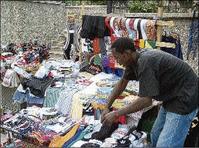Gareth Manning, Sunday Gleaner reporter

A vendor arranges his stall in Half-Way Tree, St Andrew. - Gareth Mannig Photo
EMPLOYMENT CONSULTANT and psychologist, Dr Leachim Semaj, says many people who opt to vend are not really interested in formal employment.
"There is a large group of people who really are just hustlers," he opines, "and they are really not interested in formal employment. But they just make their living by their wits," he continues.
He says while recent studies state that Jamaica has a high degree of entrepreneurism, the degree of work done does not constitute entrepreneurism. Semaj says Jamaicans like to be independent, but tend to hustle and moonlight as opposed to going into formal business.
"The ultimate job for most Jamaicans is a hustle. For example, football playing, you sell T-shirts. So, that kind of job, I don't call it entrepreneurism, because there is no inventory. They make no statutory deductions, so none of the problems that businessowners have would they have," he argues.
Unemployable
He says many of those who vend are not just simply unemployed and marginally employed, but unemployable. He contends that many are neither trained nor certified and, therefore, are unsuitable for the labour market.
"The PIOJ figures that 81 per cent of Jamaicans between 15 and 29 have no certification ... Now given that - and people must eat - the next best thing is some form of hustling, higglering or buying and selling," he says.
Semaj argues that because of weak government regulations in various sectors, pressure is put on other aspects of the country by those vending, especially roads that become crowded by vendors, adding to traffic snarls and litter on the streets.
"If there are no vendors on the streets, then persons who are interested in buying will go where the vendors are," he says.
Semaj acknowledges also that enough is not being done to officially capture the number of people who turn to these methods of employment. Current unemploy-ment data, he opines, capture only those who are seeking jobs and those without jobs and fail to represent those who are marginally employed. It, therefore, makes it harder to create policies to control problem of street vending.
Gareth.Manning@gleanerjm.com

